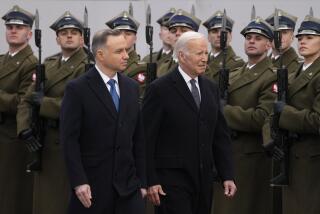Consultant to Smooth Way for Polish Exports : Trade: The new joint venture will seek to match Polish firms with U.S. partners and agents.
- Share via
SAN CLEMENTE — A Polish trade group, seeking help for Poland’s cash-starved businesses, has signed a joint-venture consulting agreement with a new Orange County firm, the first such pact involving a U.S. company
Zygmunt Szczepanski, a San Clemente-based trade consultant and head of David Paul George Co., said the agreement was negotiated last month in Warsaw with the Polonia Foundation and was recently approved by the Polish government.
The Polonia Foundation, established in 1988, is a spinoff of a division of the Polonia Society, a quasi-government organization that, among other things, promotes Poland’s international trade. The foundation is Poland’s equivalent of an international chamber of commerce and is empowered by the government to set joint-venture terms with foreign entities.
Under the pact, the new joint-venture company, Polish American Trade Cooperative, will play matchmaker to more than 200 Polish manufacturers seeking partners and agents for their exports to the West. The firm will concentrate on joint ventures with manufacturers and suppliers of consumer goods, Szczepanski said.
“We’re providing this service to the companies in exchange for capital investment and import/export services in Poland,” Szczepanski explained. “They’re producing everything from computer disks to video recorders.”
The Polish companies, represented by Polonia, include Polfa-Tarchomin, the largest pharmaceutical manufacturer in the country, and about 70 state companies and cooperatives run by Solidarity in West Pomeranaia, which is 100 miles north of Warsaw.
Similar joint-venture pacts were signed recently with companies from Western Europe and Canada, according to Zbigniew Olszewski, the foundation’s managing director in Warsaw. But this is the first involving a U.S. company.
While the bulk of Polish trade is with companies on the East Coast, Polish officials hope that this agreement will bolster the country’s trade ties with companies on the West Coast, said Zygmunt Tabor, commercial attache of the Polish Commercial Counselors Office in New York.
Polish-U.S. trade has been rising in recent years. In fact, bilateral trade jumped 77% since 1986 to $681.23 million in 1988, the latest annual trade figures at the U.S. Commerce Department show. In the first 11 months of 1989, bilateral trade rose 19% to $742.4 million over a like period in 1988, with the United States taking on a trade deficit of $73.92 million.
Poland’s joint-venture law exempts participating companies from taxes for up to six years and possibly longer, “depending on the type of venture,” Tabor said.
The agreement also called for the creation of a joint-venture bank in Warsaw, primarily “to deal with the financing and profits of joint ventures in Poland” and to handle foreign exchange transactions between the two countries.
Szczepanski said that profits gained from consulting in joint venture-related services will be split equally between the foundation and himself.
The agreement comes at a time of great economic change in Poland. According to the Agencia Zagranicznyh Investowania, the state agency overseeing foreign joint ventures in Poland, about 900 agreements were signed over the last year. But many lay dormant because of bureaucratic bungling and logistical quirks inherent in Eastern Europe’s state-controlled economies.
Until recently, state-run companies in Poland employed workers “who pretend to work” for governments “who pretend to pay them for their work,” Szczepanski said. Economists in the West have been critical of government subsidies in the Eastern Bloc, contending that this financial support kept prices artificially low and warped Poland’s real economic picture.
Now that the state has loosened its grip on the economy and lifted subsidies, company managers are scrambling to meet high production costs and shortages of raw materials through increased exports and joint ventures. But marketing is alien to many managers of state-run economies, where cutthroat competition among manufacturers is almost unheard of.
“Nobody cared about marketing because there was no need for it in a planned economy,” Tabor noted.
Part of the agreement will bring some of these managers to Orange County area colleges and trade schools for training and send “managers of manufacturing companies here to Poland to teach marketing and management,” Szczepanski said.
Szczepanski, 41, previously sold computers in Torrance’s South Bay area but he turned to consulting when prospects for increased trade with his native Poland became apparent in the last two years.
“I was born in Gdynia and that city is just 10 miles from Gdansk, the birthplace of Solidarity,”Poland’s only trade union, he said. His Polish background made it easy for him to close the deal quickly--”two weeks,” he said.
More to Read
Inside the business of entertainment
The Wide Shot brings you news, analysis and insights on everything from streaming wars to production — and what it all means for the future.
You may occasionally receive promotional content from the Los Angeles Times.








